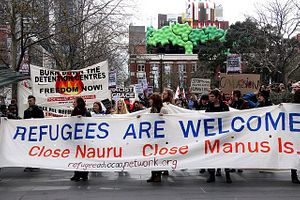For more than six months the new Australian government’s tactics of using the Navy to forcibly turn back boats, and putting asylum seekers in unseaworthy vessels and onto portable life boats before sending them back to Indonesia, appears to have stopped the flow of vessels.
However, news of a boat carrying 153 Tamil asylum seekers near Christmas Island may challenge the government’s policy. Unlike many of the boats that come from Indonesia, this boat will pose a unique challenge as it came from the Indian city of Pondicherry and took 16 days to reach Christmas Island.
While the Australian government is refusing to divulge information about the boat, refugee advocates made contact with someone on board Saturday.
The Refugee Action Coalition spokesperson said that they had been told the boat was in rough weather and that many of the children on board where ill from the more than two weeks at sea. There are 37 children believed to be on board, including a one-year-old baby.
While nothing has been heard from the boat since Saturday, there are reports that the passengers have been picked up and are on board a customs vessel capable of holding 250 people. If the refugees are transferred to Christmas Island, it will put a serious dent in the government’s claim to have “stopped the boats.” The government has implied though that the boat may be sent back directly to South Asia.
Meanwhile another boat originating from Indonesia is believed to have also been intercepted by Navy vessels.
Despite the policy of long, drawn-out offshore processing in places like Manus Island in Papua New Guniea and Nauru, introduced by the previous government, refuges still kept coming to Australia. The condition of Australia’s offshore detention centers have been heavily criticized by human rights groups as well as the U.N.
These criticisms include the indefinite detention of children, inadequate provision of water, as well as detainees being referred to by numbers rather than names.
In February this year, an Iranian asylum seeker was killed and several others injured during violence found to be perpetrated by local security contractors paid by the Australian government.
The ongoing arrival of boats has demonstrated that the government’s policies have only gone so far in “stopping the boats.” The government has refused to announce figures on how many boats have been forcibly turned back, merely claiming that they have been stopped. While the policy has added to the further deterioration of Indonesian-Australian bilateral relations, Indonesia feels that Australia’s policy is merely shifting the burden of refugees onto Indonesia.
Australia is a signatory to the UN Refugee Convention, however those seeking asylum by boat, or “illegal maritime arrivals” as they are referred to by the government, have been a highly political issue in Australia for more than a decade. Seeking asylum, by whatever method of arrival, is legal under Australian and international law.
The Liberal party went into the election last year claiming the then government’s policies of indefinite detention both onshore and offshore, including that of children, was not adequate.
Australia now settles those who are found to be genuine refugees in a third country, such as Nauru, with a deal close to being signed with Cambodia as well. The Immigration Department has been silent in the media concerning issues relating to asylum seekers, claiming that it is a matter of national security.

































